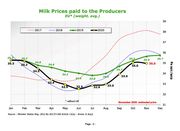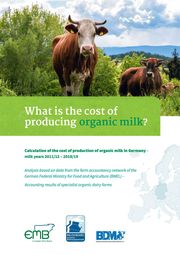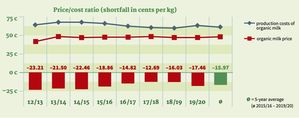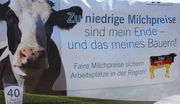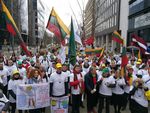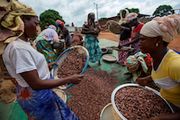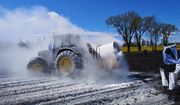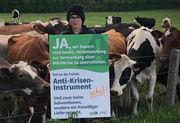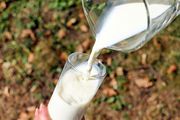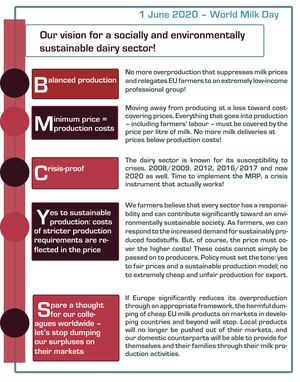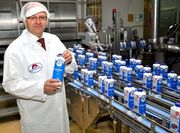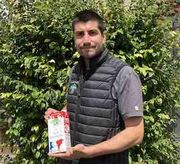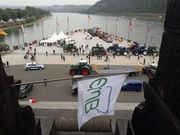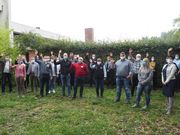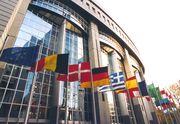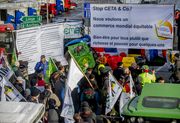EMB 2020: Year in review
- Market indicators (as on 7/12/2020)
- Organic milk put to the test: how sustainable is it?
- Important interim goal achieved: data on fat-filled milk powder will be compiled and published by the European Commission as of 2020
- The DBV sees "extremely stable" producer prices, the AbL sees "an existential threat to farmers"
- How can EU milk production be climate-friendly as well as socially and economically sustainable?
- Farmers from Lithuania, Latvia and Estonia protest in Brussels to demand a fair agricultural policy
- Fairebel chocolate milk – a product that supports women cocoa producers
- Major European milk powder campaigns with an appeal to the European Commission: “Let’s implement a volume reduction programme together!”
- Voluntary production cuts: yes – storage aid: no
- 1 June 2020: World Milk Day – our vision for a socially and environmentally sustainable dairy sector
- All going swimmingly or drowning in milk?
- Interview with Adrien Lefèvre, Vice-President of FaireFrance
- Koblenz: EU dairy farmers transform the German Corner into the European Corner with powerful actions
- Gembloux: European dairy farmers elect Sieta van Keimpema as the new President of the EMB
- EP vote on the Common Market Organisation of the Common Agricultural Policy (CAP)
- Europe’s family farmers call for a rejection of the EU-Mercosur agreement
Newsletter as PDF
Contact
EMB - European Milk Board asbl
Rue de la Loi 155
B-1040 Bruxelles
Phone: +32 - 2808 - 1935
Fax: +32 - 2808 - 8265
Dear dairy farmers, dear interested parties,

Like every year, let us use this moment to look back on the past year. When it comes to 2020, it would be no exaggeration to say: what a year! Most of us will be spending the holiday season in a smaller, more intimate setting, under a beautiful tree or around a festively laid table. Like the upcoming holidays, the whole of 2020 has been marked by COVID-19. But as you can see from the selection of articles in this edition recapping the year, the pandemic was not the only aspect that made 2020 so eventful.
On the streets, in the fields, even on the water, EMB dairy farmers made their presence felt despite the many restrictions. Baltic farmers protested in Brussels in February, impressive milk powder actions were held in many countries in spring, and we ‘accompanied’ the European Agriculture Ministers in Koblenz in late August – with our stylish new EMB masks, of course. On an operational level, our milk producers remained active, too, as you can see in our article on Fairebel chocolate milk and the interview with Adrien Lefèvre from FaireFrance.
In October, we held our postponed Members’ Assembly, where we elected our Executive Committee and discussed the European Green Deal in person and via video conference. As early as the Green Week in January as well as on the occasion of World Milk Day in June, producers highlighted the need to balance environmental, social and economic sustainability. Our organic milk cost study in November showed that there is a gap of at least 17 cents per kilogramme that needs to be filled in order to achieve economic sustainability.
An additional priority in terms of European policy was and still is the reform of the Common Agricultural Policy, where we concentrated on the Common Market Organisation (CMO). Thanks to efforts by farmers, the European Parliament’s position includes some positive, new crisis instruments like voluntary volume reduction and production caps during crises. Members of European Parliament are increasingly aware about the reality in the agricultural sector and what dairy farmers need. However, the other two institutions involved in trilogue negotiations with the European Parliament – the Council of the EU and the European Commission – are still lacking this perspective to some extent.
During the peak of the first wave of infections, we already pointed out that voluntary volume reduction was a significantly more effective instrument than private storage, which was activated at the time. Even dairies are in favour of volume reduction, as you can see in the interview with Helmut Petschar from Kärntnermilch.
I would like to take this opportunity to thank all farmers for their tireless commitment, all policy-makers that are striving for a crisis-proof agricultural sector, and all supporters and consumers who have backed our cause! Even though the situation remains difficult – in Denmark, for example, we will have lost a further 100 colleagues by the end of 2020 – I am very hopeful because of the commitment of active producers who did not even let a pandemic stop them.
On behalf of the EMB Executive Committee, I would like to wish all readers a Merry Christmas and a prosperous, joyous New Year.
Stay safe and healthy!
Kjartan Poulsen, EMB Vice-President and Chairman of the Landsforeningen af Danske Mælkeproducenter (LDM, Denmark)
Market indicators (as on 7/12/2020)
After a short dip of 2% at the beginning of November, the Global Dairy Trade Index has, once again, been on the rise since 17 November and was up 4.3% on 1 December (previously +1.8%). The average price for Italian spot milk increased in November by 1.65% as compared to the previous month to reach 35.45 cents per kg (-19.43% compared to November 2019).
The EU-27 milk price fell in November by 0.17% to be pegged at 34.96 cents per kg after it increased in October by 3.15%. On 29 November, EU butter prices were 347 EUR per 100 kg, which is a reduction of 0.3% as compared to the previous week and a price stagnation over the last four weeks. Looking back at the last three months, butter prices hardly changed and continue to remain relatively stable around 350 EUR per 100 kg. EU skimmed milk powder prices are currently 216 EUR per 100 kg, which implies a reduction of 0.5% as compared to the previous week and across a four-week comparison as well. In the last quarter, however, they also remained relatively stable at 214-217 EUR per 100 kg.
The rates for milk product futures on the European Energy Exchange (EEX) showed an upward trend. For example, contracts for skimmed milk powder for February 2021 increased on 4 December by 4.1% to 2,230 EUR per tonne month on month. Contracts for butter for the same period increased by 1.3% and are now at 3,330 EUR per tonne.
European Milk Board
Organic milk put to the test: how sustainable is it?
Study presents data about the organic milk sector, November 2020
According to the “Ökobarometer 2019” survey on organic food products conducted by the Federal Ministry of Food and Agriculture (BMEL), the demand for organic products from German consumers is constantly growing. Social standards and a fair income for producers are cited as additional reasons driving the decision to buy organic. But are these products really economically and socially sustainable?
As current calculations show, producers in Germany were paid an average 47.17 cents per kg of organic milk for the marketing year 2019/20. According to these calculations, however, the production costs amount to 64.63 cents per kg, when producers also receive fair remuneration for their work. Thus, producers were facing a cost shortfall of 17.46 cents per kg.
Over the fiveyears from 2014/15 to 2018/19, organic dairy farmers spent an average 51.70 cents exclusively on farming inputs and general operating costs without wages. This means that farm managers and their families were left with a mere 8.41 cents per kg of milk in hand as remuneration for their work. This corresponds to an hourly rate of about 7.62 euros and does not even come close to Germany’s statutory minimum wage. According to the cost forecast for 2019/20, the hourly wage this year would even be around seven euros per hour. This shows that organic milk cannot really be considered socially and economically sustainable.
The data on production costs in the German organic milk sector has been compiled by the BAL (German Office for Rural Sociology and Agriculture) and is updated every year.
However, the cost shortfall is not just an issue for producers in Germany, as Kjartan Poulsen, EMB Vice-President and organic dairy farmer in Outrup, Denmark, explains: “Like in the conventional sector, there is an increasing deficit between farm-gate price and production costs for organic milk in many European countries. It will be impossible to achieve the European Commission’s Green Deal objective – 25% organic farming by 2030 – with this ground reality. A significant increase in sustainable organic production in the EU can therefore only remain a pipe dream.”
Cost development and organic milk prices
The Milk Marker Index (MMI) for organic milk charts the evolution of organic milk production costs. For the marketing year 2019/20, the MMI for organic milk was 97, i.e. production costs for German organic milk producers reduced by three percent as compared to the reference year 2015/16 (2015/16 = 100). As compared to the previous year (2018/19), however, they increased by two percent.
Here you see the development of costs, prices and the MMI for organic milk over time.
Price/cost ratio (shortfall)
The price/cost ratio shows to what extent producer prices cover milk production costs on organic dairy farms. In the marketing year 2019/20, the milk price only covered 73% of their production costs; there was thus a shortfall of 27% or 17.46 cents per kg of organic milk.
Here you see the cost shortfall since the marketing year 2012/13.
Study on milk production costs in six key milk producing countries
Cost calculations are regularly carried out as an average of all dairy farms and are not limited to organic production. It is very clear that milk producers are not being paid cost-covering prices.
You can find milk production cost calculations for Belgium, Denmark, Germany, France, Luxembourg and the Netherlands for 2017 here.
A chronic shortfall between production costs and milk prices – what is the solution?
In order to counteract this chronic shortfall, the European Milk Board (EMB) calls for a statutory crisis instrument. The Market Responsibility Programme (MRP) observes and reacts to market signals, for example by temporarily adjusting production volumes in times of crisis.
You can find a short description of the EMB’s Market Responsibility Programme here.
Download data sheet here
EMB press release of 18 November 2020
Important interim goal achieved: data on fat-filled milk powder will be compiled and published by the European Commission as of 2020
Brussels, January 2020
When the "We should not export our problems" campaign was launched last year, the issue of fat-filled milk powder being exported to Africa at dumping prices did not figure in any way in data collection and was, therefore, given no consideration by EU policy-makers.
However, the negative effects of these exports on local production were very much felt by African farmers. Therefore, together will fellow dairy farmers from the EMB in Europe as well as NGOs like Oxfam, SOS Faim, Veterinarians Without Borders and CFSI, they organised a protest in Brussels against this dumping and met with a number of policy-makers to call for a responsible EU export strategy.
One of the demands within this campaign was for the Milk Market Observatory (MMO) to henceforth compile and publish information about EU exports of these milk-powder blends. Without transparency on this front, the European Commission would continue to grope in the dark, resulting in disastrous consequences for local milk production in Africa.
The constructive exchange between the campaign participants and the European Commission in recent years has borne fruit. The main demand for appropriate data collection has now been addressed by policy-makers: as of this year, an instrument will be implemented to monitor European Union exports of milk powder that has been re-fattened with vegetable fats/oils. Thanks to a dedicated customs code for fat-filled skimmed milk powder, it will now be possible to compile data on the exported volume and countries of destination on a monthly basis. The scope of the Milk Market Observatory, which was set up at EU level a few years ago thanks to efforts by European Milk Board dairy farmers, will thus be expanded to include important additional data.
For the campaign participants, this new instrument is an important milestone on the way to an EU export strategy that does not threaten local markets in Africa. To achieve the ultimate goal – a fair partnership with Africa among equals – many more significant developments are, of course, still needed. For further information, please refer to the "We should not export our problems" joint statement from April 2019.
Silvia Däberitz, EMB
The DBV sees "extremely stable" producer prices, the AbL sees "an existential threat to farmers"
In their year-end market data for 2019/2020, the German farmers' union DBV characterised 2019 as "an exceptional year for the dairy sector", February 2020
"On the one hand, raw milk production costs in many regions in Germany were significantly higher in 2018 and 2019 than in previous years because of the extremely hot and dry summers – and the associated poor feed harvests. On the other, producer prices in 2019 were extremely stable. The federal average through the course of the year oscillated minimally between 32.6 and 33.8 cents/kg."
According to Ottmar Ilchmann, dairy farmer and President of the German family farmers' association AbL in Lower Saxony, stability is generally understood as something positive. "However, when the DBV talks about 'extremely stable' milk prices while looking back at the past year, they definitely qualify as frontrunners in the contest for 'euphemism of the year'", explains Ilchmann, because this stability does nothing to improve the situation on dairy farms; in fact, it simply conceals the bitter truth. As Ilchmann puts it, these stable prices throughout the year also mean that the shortfall has consistently remained at about 10 cents or 25% below cost coverage levels – and this is something that the DBV chooses to give no mention. "These 'stable' prices imply extreme instability and pose an existential threat to farmers; further farm closures can be expected", says Ilchmann. In his opinion, if the DBV still saw itself as a representative of dairy farmers' interests, it should have capitalised on the opportunity to strengthen the market position of dairy farmers within the process of drawing up a dairy sector strategy. "It seems, however, that they are more concerned with upholding the interests of cooperative dairies, where their members, all too often, have a major say on executive and advisory boards", criticised the AbL regional president.
The dairy sector has been working on a "Sector Strategy 2030" for a while now. It was supposed to be presented in autumn 2019; however, there is still nothing on the table. The process is being led by a steering committee, which includes representatives from the DBV, the German Raiffeisen Association (DRV) and the Dairy Industry Association (MIV).
Article by FebL/Unabhängige Bauernstimme
How can EU milk production be climate-friendly as well as socially and economically sustainable?
Berlin, January 2020
The fact that being a farmer has been very difficult for a number of years now is no secret. For example, there is a systematic shortfall between milk production costs and producer prices. Over a five-year period, the cost shortfall for German producers has been 20 percent, which implies that production costs to the tune of 9 cents per kilogram of milk are coming out of farmers' pockets. The situation with organic milk is quite similar, with a shortfall of 21 percent in 2018/2019.
"Our farmers are getting increasingly left behind, both economically and socially", summarises Erwin Schöpges, Belgian dairy farmer and President of the dairy farmer association European Milk Board (EMB). "The orientation of the EU agricultural policy is at the root because it does not promote socially sustainable farming. It is instead aimed at the production of cheap products that can compete on international markets. This has been the situation for many years now and has also led us to take to the streets in protest for just as long." EMB Executive Committee member Johannes Pfaller from Germany adds: "If further restrictions are imposed on farmers in a situation where they are already operating at a loss, the current widespread protests should come as no surprise. How can producers, on the one hand, continue to provide cheap raw materials while, on the other, also fulfil additional cost-intensive conditions? This is simply impossible and this conflict is destroying producers." As Pfaller goes on to mention, it is very clear that the market position of producers needs to be significantly improved through an appropriate framework. This would give farmers the possibility to properly defend their economic interests.
Paper on sustainable production in the EU
In order to resolve this conflict between the pressure to produce cheap products and comply with sustainability conditions, the current agricultural policy must be amended at EU level. "There needs to be a change in tack, to head toward responsible production in the EU", says Erwin Schöpges. "To this aim, the EMB has drafted a paper that takes both socio-economic and environmental sustainability into account." It calls for the necessary implementation of a crisis instrument to dampen the effects of constant crises. This instrument would lead to less overproduction, which would contribute to better producer prices as well as to preserving resources – a key factor in environmental sustainability. This paper also rejects agricultural products being included in free trade agreements as they counteract fair and sustainable production practices.
The paper also makes it clear that policy-makers need to uphold a number of important conditions if greater sustainability – both environmental and social – is to have a fighting chance in the agricultural sector:
Before farmers are able to actually comply with demanding requirements, the underlying basis for their activity needs to be robust. This means that prices must cover all production costs, including fair remuneration for producers. The above-mentioned crisis instrument must be implemented at EU level and the market position of producers must be strengthened through an appropriate framework.
The environmental strategies and solutions underpinning the restrictions must be discussed and decided on together with producers. The positive environmental contribution farmers are already making – carbon sequestration and combating erosion, to name just two – must be duly recognised, and a fair decision must be reached on compensation for environmental compliance costs. After all, farmers cannot be the only ones bearing the brunt.
Fair cooperation between all stakeholders is the only way to achieve socially and economically sustainable as well as climate-friendly agriculture. Policy-makers have an important role to play in ensuring the correct framework is in place, so that farmers are no longer left behind but are, once again, recognised as an important part of the social fabric.
In addition to their political work, EMB producers are also tapping into their own strength and engaging directly with consumers. For instance, dairy farmers themselves have launched the Fair Milk brand in a number of countries in Europe, and it has clearly shown that cost-covering prices are not a pipe dream. But in order to allow for fair prices to become a reality beyond a niche market and to actually get a foothold in the dairy market at large, we need – as described above – an appropriate political framework.
EMB press release of 16 January 2020
Farmers from Lithuania, Latvia and Estonia protest in Brussels to demand a fair agricultural policy
Brussels, February 2020
Baltic farmers call on the EU to implement uniform direct payments for all. The European Milk Board also calls on all EU institutions to support the inclusion of an effective crisis instrument in the CAP.
For the Lithuanian dairy farmers' association (LPGA) as well as numerous other organisations from Lithuania, Latvia and Estonia, it is high time for an equal distribution of direct payments to become a part of the Common Agricultural Policy (CAP). At the protest, which is supported by the umbrella organisation European Milk Board (EMB), the Baltic producers are calling on the EU for fair and equal treatment. The European Milk Board also believes that farmers across the EU are being socially and economically left behind, especially due to recurring crises. Their request for the implementation of a functioning crisis management mechanism is directed not only at heads of state and government gathered today in Brussels, but also at all the EU institutions, as they are currently working on the CAP reform.
Same requirements but different direct payments
A number of different studies have shown that the EU milk price does not cover production costs. As long as this cost shortfall continues to prevail, producers remain dependent on subsidies. However, these subsidies vary from one Member State to the other, such that in 2017, Baltic farmers received only 54 to 60 percent of the EU average in direct payments. Jonas Vilionis, President of the Lithuanian dairy farmers' association LPGA, sees this unequal treatment as a major issue: "Direct payments are lower, but all products have to comply with the same requirements. Our farmers must comply with the same environmental protection, animal welfare and food safety standards as in other EU Member States, but without the equivalent compensation." This creates a divide between EU producers. Vilionis therefore calls for an equal distribution of direct payments. This would, however, only be possible with an appropriate CAP budget. Therefore, the EU agricultural budget should not be reduced in any way.
Cost-covering milk prices instead of subsidies
The European Milk Board, the umbrella organisation of European dairy farmers, also voices its opposition against this two-tier system. It highlights the need to reduce the dependence of farmers on subsidies to make a living. For Erwin Schöpges, President of the EMB, it is therefore important for agricultural income to be earned from the market in the medium term. "We need milk prices that cover production costs – including fair remuneration for farmers," says Schöpges.
More stable revenues with a crisis instrument in the Common Agricultural Policy
The constantly recurring crises, which lead to major losses for farmers, are a real burden in the dairy sector. The EMB, therefore, believes that a functioning crisis instrument like the Market Responsibility Programme (MRP), which would keep the dairy market in equilibrium and prevent drastic price reductions, is an absolute must within future agricultural legislation.
Sieta van Keimpema, EMB Vice-President, calls on the EU institutions like the Commission, the Council and Parliament to support the inclusion of an effective crisis instrument in the future Common Agricultural Policy. "Many EU policy-makers have seen the devastating consequences of recent crises with their own eyes. That is why truly important proposals and suggestions from policy-makers for such an instrument are now on the table. It is essential for the proposals like voluntary volume reduction with capping1 during crises as well as temporary compulsory volume reduction2 – during severe crises – to actually find their way into the CAP. This would provide the legal basis for quick reactions to market disturbances."
Treating EU farmers unfairly should no longer be business as usual: Baltic farmers should not be left behind as compared to their colleagues in the rest of the EU, just like farmers across the EU should not be left behind as compared to the rest of society. Today's protest is therefore an urgent call for fairness and equal treatment in the EU. The constructive proposals from dairy farmers show, furthermore, that such an approach is absolutely realistic.
Background: important crisis instruments for the CAP
Addressing the root cause of crises: addressing overproduction
¹ Voluntary volume reduction with capping: If the market is in crisis due to surplus production, the European Commission can call for a voluntary production reduction. Producers who reduce their production as compared to the same period of the previous year, and thus provide market relief, are paid a compensatory bonus. To ensure that these production cuts are sufficiently effective, all other producers should be subject to capping, i.e. for a certain period of time, no one should increase their production as compared to the same period of the previous year.
² Temporary compulsory volume reduction: In the case of severe market disturbances where voluntary volume reduction is not enough to rebalance the market, it should be possible to activate a compulsory volume reduction scheme for all producers. This would mean that all producers would have to reduce their production by 1 to 2 percent for a certain period of time. This reduction would be lifted after this period and producers would be free to revert back to their usual production volumes.
Please find here photos of the rally
EMB press release of 20 February 2020
Fairebel chocolate milk – a product that supports women cocoa producers
Brussels and Ivory Coast, March 2020
As of October 2019, Fairebel's chocolate milk has been made using Fairtrade-certified cocoa that guarantees cocoa producers a fair price. Consumers clearly approve: 335,637 units were sold in just three months. This commercial success will make it possible for the Faircoop cooperative to support the Women's School of Leadership in the cocoa-producing regions of Ivory Coast.
Fairebel and Fairtrade share common values: fair prices, good working conditions and a sustainable future for farmers. Consumers and producers should be more closely connected, with today's consumers showing a much greater interest in the conditions under which products they use are being made. This shared vision led to a partnership agreement in late 2019.
"For a long time now, Fairebel has aspired to create a project underscored by solidarity with the cocoa producers of West Africa", explains Erwin Schöpges, President of Faircoop. The cooperative now only uses Fairtrade-certified cocoa for their chocolate whole milk, thus supporting fair prices as well as a training project for women in the production regions of Côte d'Ivoire.
Strong women as leaders in the cocoa trade
The Women's School of Leadership is part of the Fairtrade organisation's strategy that aims at strengthening the position of women and encouraging them to take on leadership roles and responsibility within their farming cooperatives.
Yadua Adingra is one of them. She participated in the training and is now at the helm of the women's association of CAYAT, a cocoa producers' cooperative. "Thanks to everything I learnt at the Women's School of Leadership, I was able to convince my cooperative that I was the right woman for the job", says Adingra.
A joint commercial success
Whole chocolate milk has always been Fairebel's top-selling product. In the last three months, 335,637 cartons were consumed at breakfast, during breaks or as a snack between meals.
For every unit sold, the cooperative contributes an additional eurocent. "We will be contributing a total € 3,356.37 to the Women's School of Leadership project", says Schöpges. "Our Belgian cooperative will surely sell more than a million packs in 2020, which means that we will be able to invest more than € 10,000 in this wonderful project."
Excerpt from Fairebel press release of 5 March 2020
Major European milk powder campaigns with an appeal to the European Commission: “Let’s implement a volume reduction programme together!”
YES to volume reduction – NO to private storage, May 2020
“We dairy farmers say YES to an EU-wide milk volume reduction scheme and NO to private storage for butter, milk powder and cheese as a crisis measure.”
While dairy farmers across Europe turn to the Commission and the EU Member States with this appeal, a thick fog of skimmed milk powder spreads over fields in numerous French departments. At the same time, a huge stack of milk powder reaches up to the sky in the German capital in front of the Federal Chancellery, and dairy farmers in Italy, Denmark, Lithuania, Luxembourg and Belgium use milk powder events to strongly demand appropriate crisis measures for the dairy sector.
According to Erwin Schöpges, Belgian dairy farmer and President of the European Milk Board (EMB), the many milk demonstrations send an important signal to policy-makers: “Skimmed milk powder has now become the EU-wide symbol for the misguided crisis measures implemented by the European Union in the dairy sector. These measures must take a different direction if they are to have any real effect in counteracting the crisis”, says Schöpges.
The coronavirus crisis has caused the demand for milk products to collapse. As EMB Executive Committee member Roberto Cavaliere reports from Italy, the shut-down of schools, kindergartens and public institutions, coupled with the almost complete standstill in the hospitality and catering sector, has led to a drastic reduction in the purchase of milk products. “We are currently producing way too much milk and this volume needs to be reduced EU-wide. We dairy farmers are ready to take on our share of the responsibility and participate in a volume reduction programme coordinated by the European Commission”, says Cavaliere. However, this is not what the EU is proposing. His colleague Boris Gondouin, who is a dairy farmer in France and an EMB Executive Committee member as well, is rightfully upset – like so many European dairy farmers – that the European Commission has decided to back subsidies for private storage. “These subsidies do absolutely nothing to change the difficult reality faced by dairy farmers during the coronavirus crisis. Especially milk prices for producers are falling. However, 30 million euros – as announced provisionally – are spent on subsidies for processed milk products and will go to the private industry. This means that the current EU measure was taken for the processing industry, not for the farmers.“ Johannes Pfaller, dairy farmer in Germany and EMB Executive Committee member, adds: “It is totally absurd to waste resources to make products for which there is no demand. Simply for these products to then be put into storage using subsidies.”
In order to manage the milk crisis:
A crisis measure must directly address the milk volume.
The EU and its dairy farmers must take on shared responsibility. A programme that can be implemented in each and every EU Member State should be launched. Dairy farmers willing to reduce their production volume are then paid compensation through this EU programme for every litre of milk they do not produce.*
Stacks of butter and mountains of milk powder should not be allowed to pile up in the EU by subsidising the storage of processed products. Products in storage are still part of the available supply and therefore put pressure on milk prices. The announced 30 million euros would therefore be better spent on a volume reduction scheme rather than on private storage.
The EU should be willing to learn from its past mistakes. Private storage and the permission for producer organisations, interbranch organisations and others to reduce production regionally (rather than EU-wide) were completely ineffective as crisis instruments in 2015-2017. The EU volume reduction programme, on the other hand, was a success (details in study "Analysis of the EU volume reduction programme 2016/17").
* Detailed information in Market Responsibility Programme
As Danish dairy farmer and EMB Executive Committee member Kjartan Poulsen underlines, this is not the first time that the EU is choosing the wrong crisis management instrument. “Dairy farmers from the EMB and other associations highlighted the issue of massive stocks building up in storage back in 2017 with a large milk powder demonstration in Brussels. It is therefore our urgent appeal to the EU to stop using the instrument of intervention storage and to start working with dairy farmers so that we can implement a volume reduction programme together”, says Poulsen.
Today's Europe-wide milk powder demonstrations targeting the political sector will not be the last of their kind. Many German producers have already announced further demonstrations in the coming days.
Photos and videos of milk powder campaigns in Europe
EMB press release of 7 May 2020
Voluntary production cuts: yes – storage aid: no
European dairy farmers announce actions on 7 May FOR the right crisis instrument and AGAINST misguided measures by the European Commission
“The decision to address the milk crisis with the activation of private storage and without coordinated production cuts at EU level is wrong”, says Erwin Schöpges, President of the European Milk Board (EMB), expressing a clear position on the EU measures for the agricultural sector published on 4 May.
While the EU market is flooded with milk and prices are in a downward spiral, an EU-wide reduction in the amount of milk produced is the only thing that could bring market relief. Putting processed products like milk powder, butter and cheese in storage will not reduce the price pressure for dairy farmers as those products remain part of the excess supply of milk products.
“We are going to strongly express our disappointment at this current misguided decision on 7 May with milk campaigns in many European countries,” says Schöpges. These demonstrations will be combined with a constructive call on the European Commission to activate EU-wide voluntary production cuts IMMEDIATELY.
As EMB Vice-President Sieta van Keimpema explains, such a volume reduction scheme must be coordinated by the EU if it is to have a wide effect. “The EU has also temporarily allowed organisations such as interbranch and producer organisations to plan production reductions (according to article 222 of the CMO Regulation), but in the current crisis situation, this is of no use”, continues van Keimpema.
Planning of production through interbranch organisations, producer organisations and others is not effective! Why must voluntary production cuts be coordinated by the Commission at EU level?
- Comprehensive reduction is only possible through EU-wide, coordinated voluntary production cuts
There is no strong, EU-wide structure of interbranch or producer organisations that could implement such volume reductions. They could, if at all, only lead to isolated reductions within their individual organisations. There would be a negligent effect on the EU milk market as a whole. Therefore, the European Commission must take charge of coordinating this reduction so that a broad positive effect becomes possible.
- Crisis-stricken producers alone cannot raise the funds for production cuts
Existing producer organisations are funded by their members. In order to implement voluntary production cuts with compensation for every litre not produced, it is necessary to raise funds. Producers simply do not have funds to spare, especially as they are in crisis yet again. The funds earmarked by the Commission for private storage should instead be used for a coordinated EU-wide voluntary volume reduction scheme.
- Planning of production through organisations such as interbranch or producer organisations ≠ EU-coordinated production cuts
Potential planning of production by interbranch or producer organistions cannot be equated with production cuts coordinated by the European Commission. Both measures were implemented in 2016. While the possibility of production planning had no effect on milk prices in the EU, the volume reduction scheme coordinated by the EU allowed prices to recover from their rock-bottom crisis levels.
“We have informed the European Commission, the EU Parliament and the national Ministers about the very difficult circumstances that producers are currently facing and have warned them that the dairy market will collapse unless effective measures are activated. However, the current decision will result in milk powder and butter piling up in storage, pushing producers into a severe crisis yet again”, says Schöpges. “Why won't they learn from past mistakes?” This question is being asked by many dairy farmers and will figure prominently in the upcoming European milk campaigns on 7 May.
Details of milk campaigns on 7 May 2020 in different European countries
Belgium: Milk campaigns in Flanders and Wallonia
Germany: Construction of a big milk powder pyramid in Berlin
France: Milk powder campaigns on fields in several regions (Hauts-de-France, Grand Est region, Normandy, Pays de la Loire and South West France)
Italy: Milk powder campaign in Cremona and on Paulihof farm in South Tyrol
Denmark: Milk powder spraying campaign in Outrup
Lithuania: Milk powder campaign near Kaunas
Luxembourg: Milk powder campaign
EU private storage aid: no adequate response to the crises!
EMB press release of 4 May 2020
1 June 2020: World Milk Day – our vision for a socially and environmentally sustainable dairy sector
Even though for us dairy farmers and our cows all 365 days of the year are about milk, 1 June – World Milk Day – is a special day for us. It is a day when we look ahead, with our vision for the future. We want to use this day to illustrate what makes a dairy sector good, fair, and both socially and environmentally sustainable. And to make it clear once again that the necessary framework conditions must be created by policy-makers: the 'Farm to Fork' strategy must be further improved.
The dairy sector is:
fair when milk is a product that is sold at a cost-covering price; fair for those who work in the agricultural sector, when they are decently remunerated for their work;
socially and environmentally sustainable when farmers employ environmentally sound production methods, and the costs of the same are covered by the price – these costs are thus not simply passed on to producers.
For Erwin Schöpges, President of the European Milk Board (EMB), these conditions are not utopic or some sort of pipe dream. They can be put in place if there is enough social and political will to do so. “In all parts of society, the desire for change, for a more reasonable and fairer way of living has become very strong. The COVID-19 crisis has clearly demonstrated, yet again, that we are all dependent on each other and how important essential workers are to our daily existence. They are just as important as a more judicious use of our natural resources. It is clear that something needs to change.” This social push for a more sustainable and responsible way of life and production is a driver that can, at the end of the day, lead the charge in ensuring that specific measures are put in place.
For the dairy sector, such measures should pay special attention to the following points:
The European Commission is currently trying to respond to the social call for more sustainability through the Green Deal and the 'Farm to Fork' strategy. “The fact that the Commission has reacted to such a call is definitely a good sign – for sustainable development in the EU and most definitely for their own political legitimacy as well”, says Erwin Schöpges. “However, in order to ensure greater sustainability, they have to get all those who will eventually be implementing their strategies on board. In the agricultural sector, this would specifically mean farmers.”
But before anything else, farmers first need a framework that would put an end to the exploitation they currently face. This means cost-covering prices, fair remuneration and a truly better position in the value chain. It is also extremely important that farmers are not simply left to deal with the higher costs that come with stricter requirements. This would only worsen the current exploitative situation.
In this context, Sieta van Keimpema, Vice-President of the EMB, points out an aspect in the current proposals by the EU that begs significant improvement: “These important aspects are not given due consideration in the 'Farm to Fork' strategy nor the CAP reform. It is not clear how the situation of producers will be stabilised and protected from further deterioration.” Sieta van Keimpema, therefore, calls on the EU institutions to give these points the consideration they deserve in an amended, improved proposal. “Only then can we say that the EU has developed an effective plan for sustainability”, says the EMB Vice-President. She goes on to underline that the dairy farmers of the EMB, together with the EU, have an optimistic vision of the future, and are ready to share the responsibility of creating the framework conditions for a truly socially and environmentally sustainable future. The EMB has already sent the European Commission its proposals a few weeks ago.
EMB press release of 29 May 2020
All going swimmingly or drowning in milk?
Austria, May 2020
Helmut Petschar, President of the Austrian Dairy Association (VÖM) and Managing Director of Kärntnermilch, the eleventh largest dairy in Austria, is advocating for volume reduction at EU level. This measure would help stabilise the milk price and send a signal to retailers to reduce price pressure.
How has the situation on the Austrian dairy market changed since the onset of the coronavirus crisis?
The shutdown of the catering and hospitality sector has meant that dairies have no buyers for their bulk packings of cream, milk, yoghurt etc. Some food retailers are buying larger amounts because consumers are eating more meals at home. However, April and May are the strongest milk production months in Austria. As a result, some dairies have too much milk and must take individual measures. At Kärntnermilch, for example, we have asked our farmers to reduce milk deliveries in April and May by 10%. Our goal is very clear – keep the milk price stable as long as possible.
What measures would you like at EU level?
I think volume reduction at EU level is important – to stabilise prices and to send a signal to our retail partners and consumers. As soon as Kärntnermilch decided to implement volume reduction, our retail partners immediately came forward with so-called aid measures in the form of promotional offers. But this doesn't change anything. EU-wide reduction measures with aid coordinated by the European Commission would be much more effective. In such a scheme, farmers would receive compensation for the milk they do not deliver. Private storage is a form of support but at some point, these stocks end up back on the market.
What do you think would be the timeframe needed to implement EU-wide volume reduction?
That is exactly the issue we are currently facing. We cannot wait till autumn to implement such measures, they must be activated as soon as possible for April, May and June, so that we can react accordingly.
Aid to the tune of 10 million euros is going to be provided through the interbranch organisation in France. Your thoughts?
I think the first step needs to be support measures decided at European level, so as to trigger an effect across the board. I think that would make more sense.
How would you evaluate the behaviour of food retailers during the coronavirus crisis?
Very recently, we have seen how retailers have been portrayed in the media as real saviours. However, the reality is that if farmers and dairies do not continue their daily production, there is no way of guaranteeing security of supply. This phase has also made it patently clear that family farms and regional processing facilities are absolutely essential.
What expectations have you identified among consumers?
Consumers do not expect price reductions but are, in fact, happy to be able to buy such high-quality products at an affordable price. More and more of them are reaching for local products. Milk and dairy products are not price drivers in any way. In this context, I have to appeal to the sense of duty and good will of food retailers to resist the temptation to capitalise on this period to lower prices, thus endangering the existence of small farms and destroying traditional farming structures. I currently see this as a real threat.
Excerpt from the interview ‘Milchbauern: Wir brauchen Handel und Konsumenten’ (Dairy farmers: we need retailers and consumers – in German) by Claudia Jung-Leithner, Austrian Chamber of Agriculture, on 12 May 2020
Interview with Adrien Lefèvre, Vice-President of FaireFrance
France, July 2020
The crisis triggered by the COVID-19 pandemic has also hit the dairy sector. Adrien Lefèvre, Vice-President of FaireFrance and dairy farmer in the Ardennes, answers some of our questions.
How has the current situation affected the sales of FaireFrance fair milk?
When the lockdown was announced, consumers flocked to shops. We were lucky to have an adequate stock of our fair milk products in these same shops. Long-life products like UHT milk and cream were in high demand from customers who, at that point in time, did not know how long this situation would last. Furthermore, FaireFrance products are unique because they are entirely produced in our country, and this was a plus-point for citizens looking to reorient their consumption to local products.
How have FaireFrance sales evolved in this unusual period?
During the lockdown, the sales of FaireFrance products increased by 80% as compared to the same period in 2019. There was high demand for semi-skimmed milk in cartons. There was only a slight variation in demand for organic milk. In order to favour larger productions, we made some strategic choices, most notably by changing our palletisation (half pallets instead of full pallets) and by temporarily discontinuing the production of 50-cl packs.
How are farmers managing to deal with the current exceptional circumstances, in addition to their daily work on the farm?
The farmers who work with the brand and especially our Board members and employees held a number of online crisis management meetings because we are all from different regions and we had to find quick solutions, mainly to solve the difficulties in ensuring that shops were kept supplied. Of course, the crisis triggered by the pandemic has led to some complications, especially due to sections of the transport sector being put on short-time work programmes and delivery times thus becoming twice as long. Furthermore, issues with some forms of palletisation and certain kinds of packaging also led to products being temporarily out of stock.
At this juncture when there is major uncertainty about milk prices all over Europe, could fair milk be a solution?
Yes, in these exceptional times, fair milk is a veritable crisis management instrument. Farmers working with FaireFrance receive a guaranteed price of 45 cents per litre of milk sold. The significant increase in sales has led to real, additional revenue for our members and has also been the perfect response to the expectations of our consumers and citizens.
Do you think that these conscious consumers will continue to buy FaireFrance’s fair milk products?
We have been pioneers in this field since we began to sell our first packs of milk in 2013, and we have only seen our pool of consumers grow. Our concept is ideal to guarantee fair remuneration to every stakeholder in the sector. It could not be more sustainable. In addition, our initiative responds to the changing consumption behaviour of citizens who prefer to buy local products rather than low-cost products that are often imported. The way I see it, this crisis will only speed up these positive changes in consumption.
Thank you for your input, Mr Lefèvre!
Vanessa Langer, EMB
Koblenz: EU dairy farmers transform the German Corner into the European Corner with powerful actions
Their appeal to EU Agriculture Ministers: “Don’t forget the social aspects of sustainability!", August 2020
"We farmers are ready to do more in terms of sustainability if we are guaranteed full production cost coverage henceforth – including a fair income for producers – and that EU standards are not undermined by trade agreements!”
Under this banner, a boat carrying dairy farmers from the European Milk Board (EMB) and the German dairy farmers’ association (Bundesverband Deutscher Milchviehhalter, BDM) set forth on Monday from the Deutsches Eck (German Corner) towards the EU Agriculture Ministers meeting in Koblenz. On this day, these farmers from across Europe, together with the Fair Milk cows in the colours of different European countries onboard the vessel, transformed the German Corner into the European Corner. This location served as the starting point for numerous powerful actions by dairy farmers. In addition to the highly symbolic voyage, the BDM and EMB also organised a demonstration and protest action at the meeting venue of the EU Agriculture Ministers to demand a holistic approach when looking at sustainability.
For Erwin Schöpges, Belgian dairy farmer and EMB President, the actions in Koblenz send an important message to the Ministers: “We European dairy farmers are ready to do our part for greater environmental and climate protection as well as better animal welfare. However, we can only afford greater environmental sustainability when the social and economic aspects are also given the same degree of consideration. It is the only way to ensure that farms stay in business and that young farmers have future prospects.” During the demonstration at the Rhein-Mosel Hall, the meeting venue for the Agriculture Ministers, Sieta van Keimpema, the EMB Vice-President from the Netherlands, adds: “It is also essential that European standards are not undermined by imports from third countries. A comprehensive sustainability strategy must prevent product dumping. This is only possible if agricultural products are excluded from free trade agreements.”
While doling out the soup they have got landed in by the Agriculture Ministers – a symbolic action representing the misguided agricultural policy – dairy farmer and EMB Executive Committee member Boris Gondouin from France comments: “A comprehensive sustainability strategy also includes a milk price where you can earn a living. However, we see a chronic shortfall in cost coverage across Europe due to excessively low prices. The coronavirus pandemic was just one more in an entire string of crises that has pushed producer prices to rock-bottom.” His colleague Erwin Schöpges specifies: „We represent a sector, where crises are nothing new, and the latest crisis has proven that instruments like intervention storage offer no real solutions. What we need are effective crisis instruments that would allow for flexible temporary supply adjustments. The Market Responsibility Programme is the EMB’s constructive contribution towards finding such a solution.”
“Effective crisis instruments and a reorientation of EU agricultural policy are the only way to ensure the continued production of high-quality milk products. We must move away from the current cheap and more model, where producers are forced to produce cheap agricultural raw materials at their own cost, and move toward real socially, economically and environmentally sustainable production”, reiterates Johannes Pfaller, EMB Executive Committee member and dairy farmer from Germany, as they sail toward the Agriculture Ministers on the Mosel in the afternoon. His clear appeal to the EU Agriculture Ministers: “If you truly want to strive for sustainability in Europe and want to successfully implement the proposed strategies like the Green Deal and the 'Farm to Fork' strategy, then you have to work with farmers and not against them. Meet with us and let’s work together to ensure the sector’s future.”
In addition to political advocacy, the EMB dairy farmers also rely on their own strength and direct contact with consumers. For example, the Fair Milk brand, which has been launched on the market by dairy farmers themselves in a number of European countries, has clearly shown that cost-covering prices are not a pipe dream. But if this brand is to go beyond a market niche and become a player on the general dairy market, the appropriate political framework – as described above – is a must. This framework should be determined through in-depth discussions with farmers in the EU.
You can read about proposals to effectively engage dairy farmers to achieve the EU sustainability strategies here.
Signs used during the campaign
EMB press release of 31 August 2020
Gembloux: European dairy farmers elect Sieta van Keimpema as the new President of the EMB
Gembloux, October 2020
At its recent General Assembly, the European Milk Board (EMB) elected former Vice-President Sieta van Keimpema from the Netherlands as its new President. Her appeal to politicians: the Green Deal cannot become a reality without respect for economic and social sustainability.
Kjartan Poulsen from Denmark was chosen by the members for the post of Vice-President. In addition, current Executive Committee members Boris Gondouin from France, Pat McCormack from Ireland and Roberto Cavaliere from Italy saw their mandates renewed. The EMB also welcomed Elmar Hannen from Germany and Guy Francq from Belgium as new members of the Executive Committee.
Outgoing President Erwin Schöpges, who wishes to focus henceforth on the development of Fair Milk in Belgium and some African countries, was given a warm send-off by his fellow dairy farmers. They praised him for his tireless political work and tremendous involvement in the organisation of impressive demonstrations, which have contributed significantly to the development of the EMB. The Assembly also expressed its heartfelt gratitude to Johannes Pfaller from Germany, who stepped down from the Executive Committee after serving for two and a half years, for his long-standing commitment at the EMB to fight for fair trade relations and against the dumping of European surpluses in African markets.
Incoming President Sieta van Keimpema told the EMB members at the Assembly that she believed that representing the interests of European dairy farmers before the EU institutions would continue to remain very important. “I would like to thank you for your vote of confidence”, she said to the members while also looking at the upcoming priorities and challenges: “Advocating for a crisis-proof agricultural policy will be at the very top of the EMB agenda. The European Green Deal and the 'Farm to Fork' strategy (F2F) also need to be considered from a clear producer perspective and the EMB will continue to engage actively with political decision-makers and provide constructive contributions.”
From the intensive exchange on the Green Deal and the F2F strategy at this Assembly of EMB dairy farmers, it was clear that cost-covering prices and a stable income for farmers must become a real priority for EU policy-makers within their environmental strategies. “Economic and social sustainability must be given the same degree of importance as environmental sustainability”, said van Keimpema. “This means that we have to create a framework where the costs of climate and environmental requirements are covered by the price and are not simply passed on to be borne by producers.” Her fellow Executive Committee member Elmar Hannen added: “We have to reach a stage where the price covers what society demands. That is the only way to ensure a future for dairy farmers.” According to Vice-President Kjartan Poulsen, this means that the European Commission’s currently vague goal of improving the position of producers must be fleshed out and made a reality with a concrete strategy. “The EMB expects a clear indication of what steps are going to be taken to achieve this goal, so that it does not simply remain empty words.”
In addition to their political work to ensure that stable producer income is treated on an equal footing, the EMB’s dairy farmers also lead by example when it comes to holistic sustainability. Belgian Executive Committee member Guy Francq explains: “With the Fair Milk project, we have already demonstrated in many European countries that cost-covering prices and environmental and climate protection can go hand in hand. Fair Milk also helps build bridges between producers and consumers.” French Executive Committee member Boris Gondouin also believes that Fair Milk still has growth potential: “For us at the EMB, it is very important to take this project to other countries as well.” He adds: “But if cost-covering prices are to become commonplace in the dairy sector as a whole, we need – as described – the appropriate political framework.”
Photos of EMB General Assembly
EMB press release of 8 October 2020
EP vote on the Common Market Organisation of the Common Agricultural Policy (CAP)
The European dairy farmers welcome the adoption of new crisis instruments as a first step, October 2020
“The vote on the Common Market Organisation in the European Parliament showed that many MEPs are aware that the EU agricultural sector needs effective crisis instruments”, says EMB President Sieta van Keimpema from the Netherlands, summarising the opinion of the European dairy farmers’ association about the European Parliament's partial decision specifically on the Common Market Organisation (CMO) within the CAP.
The CMO defines among others the relationships between market stakeholders as well as measures to be taken in the event of crises. Late last week, MEPs voted on the European Parliament’s position on the CAP reform, which will be used as a basis for trilogues with the European Commission and the Council of the European Union due to begin shortly. The new Article 219a (from amendment 149), which envisages voluntary production cuts during crises, is part of the CMO position. “Coupled with the adoption of Article 219b (from amendment 150) that foresees possible production caps during the implementation of reduction programmes, the CMO might soon have an instrument that could present an effective response to chronic crises”, says EMB Vice-President Kjartan Poulsen from Denmark. At the same time, however, it is regrettable that compulsory production reduction (in amendment 277), which would be necessary to deal with severe, long-lasting crises, was rejected. “The very close vote on this amendment, nonetheless, confirms that a large number of MEPs are fully aware that the instrument of temporary compulsory volume reduction is also an urgent need”, explains Sieta van Keimpema. “We would like to thank these MEPs, who are clearly familiar with the dynamics of crises and the need for effective reactions.”
The dairy farmers are also happy to see that the adoption of Article 218b (amendment 147) will lead to the implementation of an early-warning mechanism in the CMO. In this context, however, the EMB has indicated that a crisis situation still needs to be properly defined so that appropriate instruments are actually activated in a timely fashion.
An overview of the evaluation of dairy farmers about other articles of the CMO reform
With respect to intervention as an instrument, the adoption of amendment 232 is a significant step forward in increased transparency.
The newly inserted Article 172a (amendment 244) of the CMO takes on board value-sharing clauses and a consideration of production costs. Even if it is not binding, it shows that these key issues have gained the recognition they deserve among MEPs.
Dairy farmers are well aware that market disturbances in the EU agricultural sector are a regular occurrence. With the establishment of a monitoring and management system for these disturbances (Article 222a from amendment 248), it will now be possible to deal with future crises in a more effective manner.
In terms of contractual relationships in the dairy sector (Article 148), it is good to see that the European Parliament reiterates the need for prices in contracts to be fixed on the basis of production costs. However, as it is still left up to member states to decide whether they wish to make the use of contracts compulsory, no significant improvements for the EU dairy sector as a whole can be expected in this regard.
Dairy farmers regret the rejection of amendment 270: the proposed increase of EU milk pooling limits in Article 149 from 3.5% to 7.5% would have been an important positive development for producer organisations. It would have allowed farmers to negotiate on an equal footing with processors, who are not subject to the low pooling limit that currently restricts producers.
On the other hand, dairy farmers are happy to see that MEPs repeatedly mention the goal of sustainable income in their positions (amendment 3 for Recital 2 and amendment 47 for Article 1a); that imports cannot undermine EU standards (amendment 138 with respect to Article 188a) and that an observatory should be set up for the EU agricultural sector as a whole (amendment 146 for Article 218a).
MEPs have made significant strides in their position specifically on the Common Market Organisation – even if the key instrument of temporary compulsory volume reduction during crises was rejected by a small margin and the pooling limit was not increased to 7.5%. It is, therefore, even more important that the improvements the European Parliament has agreed on must be anchored in the final CMO in their entirety and should not be watered down by the other two institutions in the upcoming trilogues. “We call on the Council and the Commission to agree to these essential changes that shall be brought to the negotiating table by the European Parliament – the elected representatives of EU citizens. Fulfil your role as EU institutions and bring about a real reform that will equip the EU agricultural sector in the CMO with appropriate crisis instruments”, appeals EMB President Sieta van Keimpema.
EMB press release of 26 October 2020
Europe’s family farmers call for a rejection of the EU-Mercosur agreement
Not just corrections, but a new orientation: we need a trade policy that ensures fair, cost-covering prices, protects the environment, and upholds human rights, September 2020
In a joint statement by European farmers, 43 farmer organisations in 14 countries – Austria, Belgium, Croatia, Denmark, France, Germany, Italy, Lithuania, Luxembourg, Netherlands, Norway, Portugal, Spain (including Basque Country and Galicia) and Switzerland – as well as the umbrella organisations European Coordination Via Campesina (ECVC), the European Milk Board (EMB) and Biodynamic Federation Demeter International call on their respective governments to reject the EU-Mercosur agreement.
This free trade agreement is being contested by the governments of some member states. Clear criticisms have been voiced by Austria, the Netherlands, France, Ireland and Belgium. Germany, who currently holds the EU Council Presidency, announced that it wishes to make progress on the ratification of the EU-Mercosur agreement, even though Federal Chancellor Angela Merkel has recently expressed concerns about the agreement. The fear is that Germany will accommodate the critical countries with small corrections and push them towards ratification.
European farmers call on their governments to reject the EU-Mercosur agreement. As (editor's note: former) EMB President Erwin Schöpges puts it: “With the EU-Mercosur agreement, imports of products like meat, sugar and soya from the Mercosur countries are set to increase, which, in turn, will encourage them to adopt a strongly export-oriented, even more industrial production model. The Amazon rainforest, which is integral to worldwide climate protection and biodiversity, must remain safe from this system. Human rights violations are also a factor that cannot be ignored in the context of such developments. At the same time, family farms in Europe are faced with major challenges to produce foodstuffs that uphold stricter environmental and animal welfare standards, which implies higher production costs. Increased, non-equivalent imports from the Mercosur countries exert an additional price pressure on Europe’s family farms. This trade policy and these unequal production, environmental and social standards that favour the agro-industry are simply speeding up the disappearance of small-scale farms on either side of the Atlantic.”
The farmers call for a trade policy that promotes fair, cost-covering producer prices across the world, environmental protection, biodiversity and animal welfare, human rights, small-scale farming, regional foodstuffs, the preservation and further development of European standards, and fair working conditions.
Please find here the joint declaration by European farmers
European Milk Board, September 2020
Impressum
European Milk Board asbl
Rue de la Loi 155
B-1040 Bruxelles
Phone: +32 2808 1935
Fax: +32 2808 8265
E-Mail: office@europeanmilkboard.org
Website: http://www.europeanmilkboard.org

